E-Archive
Articles
in Vol. 7 - September Issue - Year 2006
Service Providers of Surface Finishing (SPSF) and Strategies for Meeting Quality Requirements
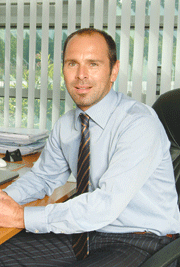
Author: Dirk Gather
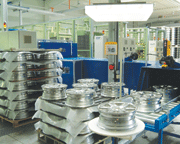
End control for decorative surfaces - polished alloy wheels
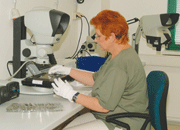
Equipment for quality tests

Deburring of gear wheels - 100 percent process stability required

Combined and automated process for deburring and plating of gear wheels - developed for the automotive industry
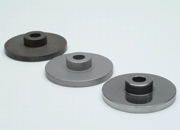
Automotive industry - perfect surface required
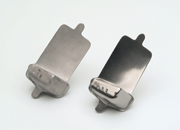
Finishing of turbine blades requires measuring the surface roughness
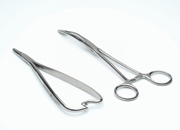
Surgical instruments - not without detailed process documentation
For many manufacturing companies surface finishing technologies are to a large extent unknown terrain. For some technologies, for example mass finishing and shot blasting,, there are no training courses or appropriate courses of studies on offer by either commercial chambers or technical universities. Therefore, specialized departments of companies have to find alternative possibilities to develop specific solutions for surface treatment.
The trend to exclude processes of surface treatment from the direct production chain in order to achieve a higher level of quality for the sometimes very complex and unknown production steps of surface finishing has been growing for some years. The widespread opinion that deburring, grinding, polishing and other finishing procedures could run alongside direct production without any control and expert knowledge, turned out to be an expensive mistake for many companies. Process instability, interferences, missing expert knowledge and unqualified employees cause a varying and uncertain degree of quality. For companies who want to keep their image as a reliable and serious supplier this is an unacceptable state, hardly explainable to any customer.
The requirements for surface quality and outlines of a work piece, which are mostly defined in technical drawings and descriptions, require a high level of procedure knowledge, process control, employee qualification and documentation efforts. At this point Service Providers of Surface Finishing (SPSF) have the chance to establish themselves as qualified, certified and customer-oriented partners. In general, these services providers are smaller companies who are specialized on a manageable number of matching technologies.
When an order is placed, high requirements are made on the company with regard to quality and organization. Customers take complying on all relevant quality criteria, short delivery times (often just-in-time), management of all logistical tasks, high flexibility all combined with very favourable prices for granted.
At the same time the tasks and in-house requirements of SPSF are also very complex. In order to keep a high-level quality management system, continuous strategic planning and critical self-consideration are necessary.
In detail this includes:
Adaptation of the used technologies to a great number of different customer workpieces and complying with the various, complex quality criteria and technical standards demands.
It is just one aspect, to determine whether suitable technical facilities with appropriate procedures are available in order to work on new customer workpieces according to their demands. To what extent the required quality of parts can be achieved with the available equipment, requires a thorough internal examination as well as excellent external communication with customers in order to be able to understand and evaluate all demands. Investments necessary for quality compliance have to be part of the calculation and are, therefore, economically relevant.
The quality of resources such as abrasive media, shot blasting material, chemical additions etc. determines the quality of the entire process.
The selection of qualified and certified suppliers of resources is very important when establishing a trusting customer relationship in the beginning. Continuous high quality and in-time delivery are essential aspects of quality management for every SPSF. Within the framework of test reports and quality assurance agreements the use of resources has to be reported frequently. Detailed information i.e. in data sheets and product specification lists are also often required. To meet these requirements, serious and reliable suppliers are essential.
Adaptation of the periphery such as loading-, drying- and preservation equipment, packaging and handling devices.
Quality is often determined only to a small part by the production process itself. Just as important are all working cycles before and after the actual processing. Workpieces have to be put into the process and taken out, dried, examined and packaged. All these peripheral working cycles should require at least the same attention and care as processing itself in order to be able to meet high quality standards. With regard to strategic planning these aspects play – accordingly – an important role.
High flexibility with respect to provision of machines, resource availability, process development and process optimization, personnel availability, capacity extension etc.
For a modern, dynamic and flexible SPSF even those departments which are usually only remotely connected to quality, are of great importance. Maintenance, for instance, has to guarantee the availability of technical equipment at a continuously high quality level. The purchase department is responsible for the in-time provision of machines and resources in sufficient amounts and, likewise, at permanently high quality levels. The personnel department is responsible for the provision of qualified personnel and has, thereby, a decisive influence on the quality level which a company is able to produce.
Complete documentation to be able to reproduce all processes and their results.
Today in many sectors of industry, process descriptions, the determination of process parameters, test reports, quality assurance agreements, or the description of quality standards are expected. For this the establishment of a well-functioning quality department with the necessary resources and qualified personnel is a precondition.
All relevant quality inspection devices, for example test equipment, microscopes, instruments to measure roughness, corrosion test facilities, etc.
Proving quality standards requires testing. Besides well-trained personnel, various devices and equipment are necessary to do so. One possibility is that the service provider orientates himself to customer requirements and gets all necessary testing equipment for a specific project. A second possibility is the establishment of a specific department which has all necessary means for all kinds of testing at its disposal – so to speak a preventative measure to create confidence. However, this is only possible if sufficient financial means are available. Because quality testing equipment usually involves a high investment this needs to be carefully considered when preparing the calculation.
Training and qualification of personnel
The continuous improvement of processes is supposed to secure a permanently high quality level. Without well-trained and highly-qualified employees it is impossible to do so. Therefore, serious service providers include the continuous professional training of employees in the strategic planning process.
Only SPSF who are able to meet and demonstrate all of the above mentioned points, have a realistic chance of having their quality management system certified according to widely accepted norms and standards. As can be seen from these aspects, any measures of quality assurance increase the price for surface finishing services – with no alternatives. Anyone who wants to successfully compete in today’s market has to meet all requirements and has to be able to present his high-quality politics convincingly. Nowadays, short, medium and long term strategic planning with regard to quality objectives is expected of any reputable company and highly influences its image.
For Information:
Gleitschliffzentrum Oranienburg
Am Gleis 3, 16515 Oranienburg , Germany
Tel:: +49.3301.5232-0, Fax: +49.3301.5232-29
E-Mail: dirk.gather@gleitschliffzentrum.de
www.gleitschliffzentrum.de



























